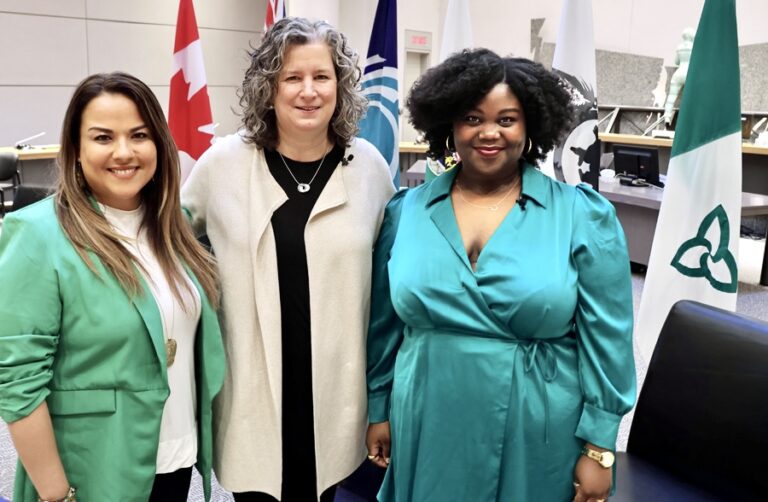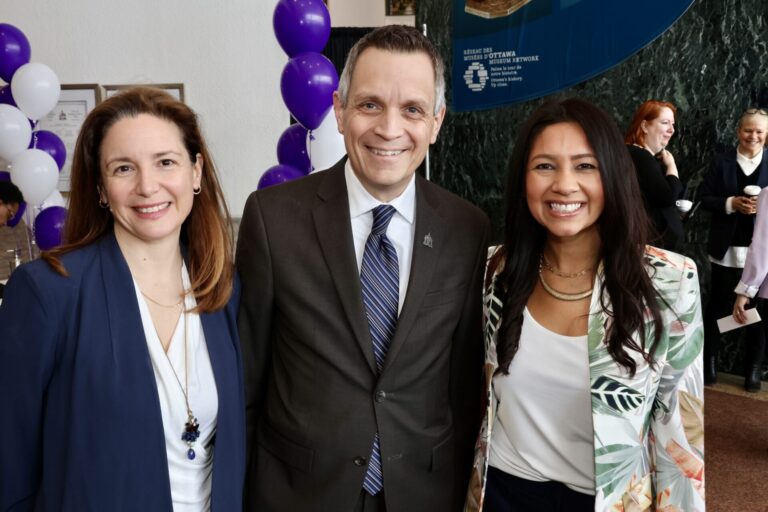Ottawa City Hall was filled with early morning buzz on Wednesday as more than 200 invited guests of the International Women’s Day (IWD) reception first broke bread before turning their attention to breaking barriers.
The gathering was hosted by Mayor Mark Sutcliffe and Somerset Ward Coun. Ariel Troster, council liaison for Women, Gender, Equity and 2SLGBTQ+ Affairs.
Attendees mingled over coffee and a buffet breakfast in Jean Pigott Place, as bright morning sunshine streamed in, before taking a seat in council chambers. There, they listened to a meaningful armchair discussion featuring the mayor with Louisa Taylor, co-founder and director of Refugee 613, Sharon Nyangweso, CEO and founder of full-stack inclusion and communications agency QuakeLab, and entrepreneur and consultant Karla Briones, who helps immigrant women, BIPOC and underrepresented entrepreneurs open and scale their businesses.
The room also heard brief remarks from Wendy Stephenson, Ottawa’s first female (interim) city manager.
Sutcliffe, who arrived with his wife, Ginny Sutcliffe, recognized all the “amazing women” in his personal and professional life. He spoke about his late grandmother, a fiercely independent woman who, born in Paris in 1905, married a Chinese man in 1927. “I often think about how much courage that took to marry the love of her life under those circumstances at that time, and then they moved to China, where she knew absolutely nobody.”
His grandmother went on to have six daughters, four of whom survived infancy. The family came to Canada in 1950 to escape Communism. “My grandmother was a great role-model for me and for all the women in our family. I think of her today.”
Briones also talked about her grandmother, whose 89th birthday is today. She was born into extreme poverty in Colombia, fled an abusive home at age 16, and ended up becoming Mexico’s first female bullfighter on horseback.
Money had been very tight when Briones came to Canada at age 18 with her family. Her father held down various jobs until he was allowed to practice veterinary medicine again, here in Canada. Briones, who worked three three-part jobs in university to help put food on the table, recalled how close her family was to experiencing homelessness.



Among the attendees was Sen. Bernadette Clement, also the former mayor of Cornwall (she made history in 2018 when she became the first Black woman in Ontario to be elected as mayor). Former Ottawa mayor Jacquelin Holzman attended, as did former Gloucester mayor Claudette Cain and former provincial cabinet minister and city councillor Madeline Meilleur. Also spotted was Carleton University president and vice-chancellor Benoit-Antoine Bacon.
And while IWD is about celebrating women’s social, economic, cultural and political achievements, and about recognizing how far women have come, the hot topic of conversation that morning was removing the barriers and obstacles to gender equity, as was adopting a more intersectional approach.
“There’s still so much more to be done,” said the mayor of the need to create conditions that allow women to succeed. “It’s not just about putting everyone at the same starting line, it’s about the path after that.”
Taylor said her approach is to treat every member of her female-dominated team at Refugee 613 “as a complete human being who has dreams and obligations and experiences that are outside the nine to five. If they need to get something done with their family, it’s not even an issue; I accommodate that 100 per cent.”
Refugee 613 is a coalition of citizens, settlement agencies, sponsorship groups and community partners working to improve the settlement and integration of refugees in our city. Taylor said it’s not lost on her that she’s a white, privileged woman leading an organization dedicated to helping many women who are marginalized and racialized.
It’s her dream, she said, to promote racial equity by eventually moving out of her position once the organization has more stability. It’s important that the next leader is set up to succeed, she stressed. “I’m looking for the opportunities to open the door for someone else.”
Taylor isn’t just talk, Nyangweso assured everyone. “A great example is today: Louisa had called me and said, ‘Hey, we’re going to be speaking (at IWD). You want to come?”
The discussion wrapped up with the women sharing some final thoughts. Briones asked her audience members to reach out to someone, either at work or through their LinkedIn network. Invite them for a coffee or a virtual chat, and see if you can help them through your existing professional network, she suggested.
“Don’t wait for them to reach out to you; you reach out to them. You will break down so many barriers.”















